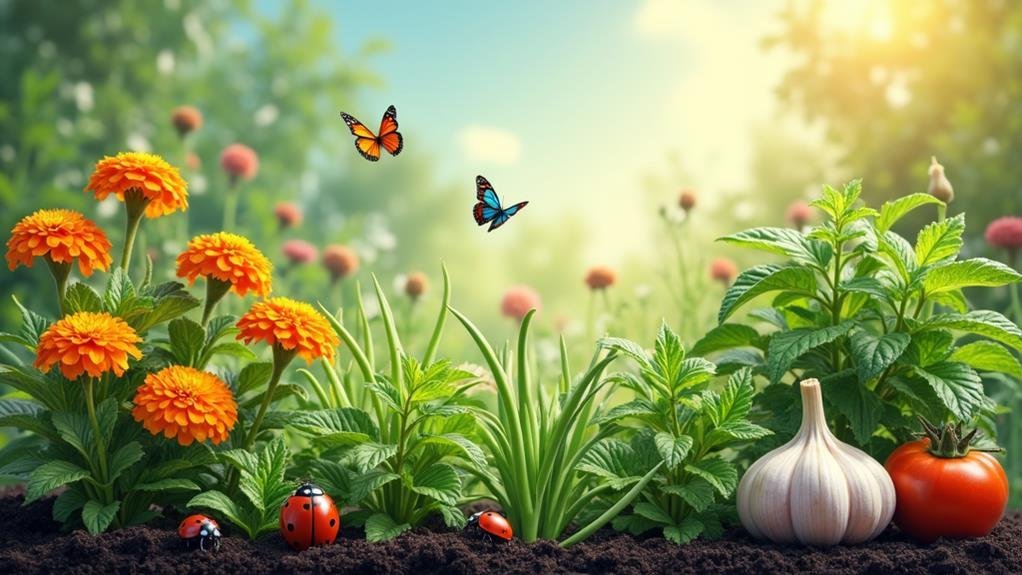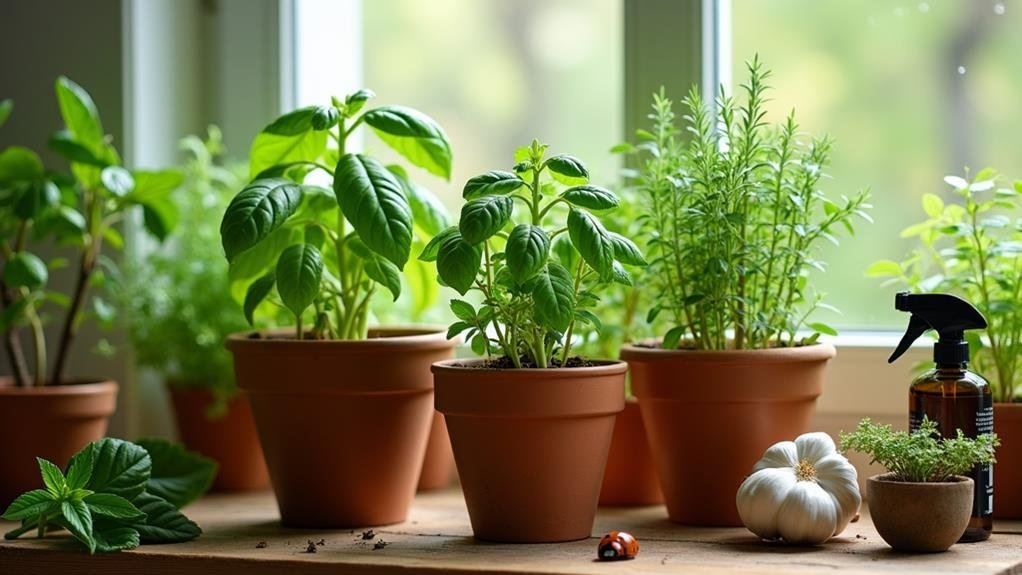You know how frustrating it can be to watch pests invade your garden, but you might not realize that effective natural methods exist to keep them at bay. From essential oils like peppermint and lavender to innovative companion planting techniques, there are numerous strategies you can employ without resorting to harsh chemicals. Imagine enhancing your garden's health while simultaneously repelling unwanted visitors. Curious about how these methods can transform your gardening approach? Let's investigate some practical solutions that could change the way you think about pest control.
Essential Oils for Repelling Pests
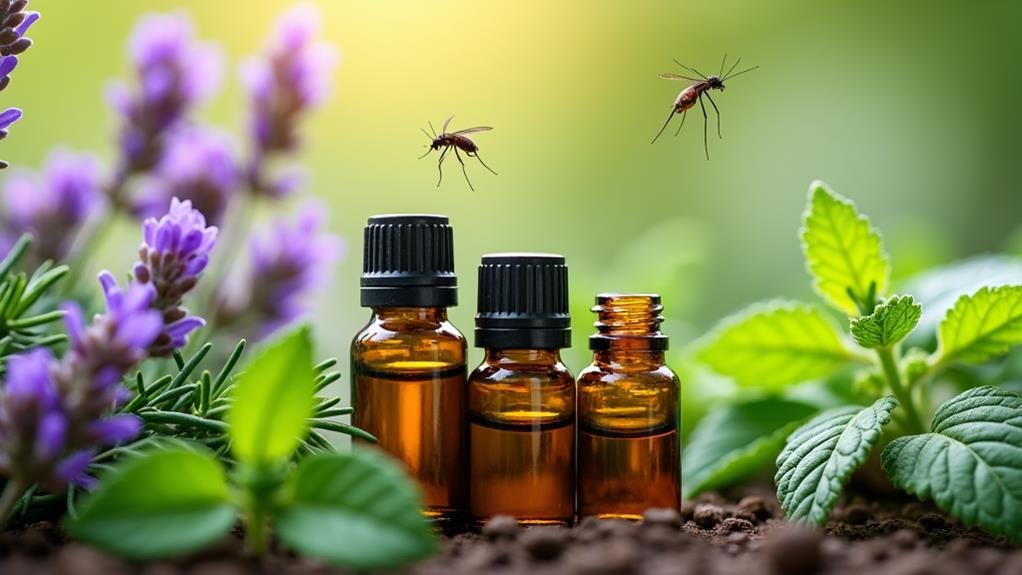
In the matter of keeping garden pests at bay, essential oils can be your best ally. These natural extracts not only smell great but also pack a powerful punch against unwanted visitors like aphids, mosquitoes, and spiders. By using essential oils, you can create a safer, chemical-free environment for your plants and yourself.
To start, consider oils like peppermint, lavender, and eucalyptus. These oils are known for their pest-repelling properties. You can mix a few drops with water in a spray bottle and apply it directly to your plants. Just remember to test a small area first, as some plants may react differently.
Another option is to soak cotton balls in essential oils and place them around your garden. This method can help create a barrier that pests find uninviting. Plus, the pleasant aroma can improve your gardening experience!
For best results, reapply your essential oil solution every few days, especially after rain. It's a simple and eco-friendly way to maintain your garden's health while keeping pests in check.
Welcome the power of nature, and let essential oils protect your garden!
Companion Planting Techniques
Companion planting offers another effective natural strategy for repelling garden pests while promoting plant health. By strategically placing certain plants near one another, you can create a natural barrier against unwanted insects.
For example, marigolds are known to deter nematodes and aphids, making them an excellent companion for vegetables like tomatoes and peppers. You can also try planting basil alongside tomatoes; not only does basil improve the flavor of tomatoes, but it also repels whiteflies and other pests.
Likewise, planting garlic near roses can keep aphids at bay, protecting your beautiful blooms.
It's essential to take into account the growth habits and nutrient needs of your plants. When you pair deep-rooted plants with shallow-rooted ones, you maximize space and soil usage. This synergy can lead to healthier plants overall.
To get started, research compatible plants and plan your garden layout accordingly. You'll find that companion planting not only reduces pest problems but also encourages a more vibrant and productive garden.
Homemade Insecticidal Soaps
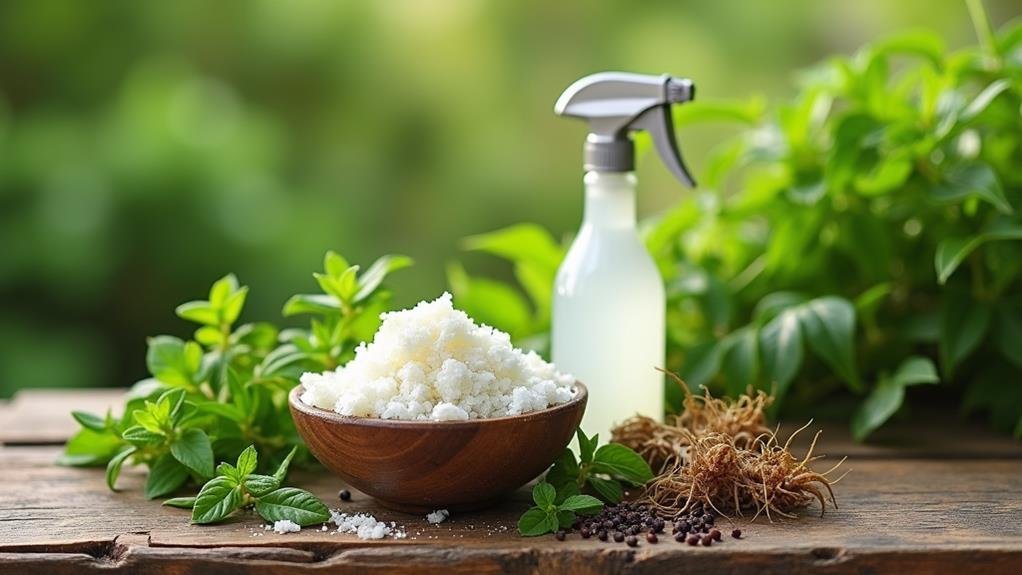
While pests can wreak havoc on your garden, homemade insecticidal soaps offer a simple and effective solution to combat them. These soaps work by suffocating soft-bodied insects like aphids, spider mites, and whiteflies. The best part? You can easily make them at home using everyday ingredients.
To create your own insecticidal soap, mix one to two tablespoons of pure liquid soap—like Castile soap—with a quart of water. It's essential to use a soap that doesn't contain additives or fragrances, as these can harm your plants. Once mixed, pour the solution into a spray bottle for easy application.
Apply the soap directly onto the affected plants, making sure you cover both the tops and undersides of the leaves. Do this in the early morning or late evening to avoid direct sunlight, which can cause leaf burn.
It's best to test a small area first to guarantee your plants tolerate the solution. Reapply every few days and after rain, as the soap can wash away.
With regular use, these homemade insecticidal soaps can help you keep your garden healthy and thriving, all while avoiding harsh chemicals.
Natural Predators to Introduce
Introducing natural predators to your garden can considerably reduce pest populations without the need for harmful chemicals. By inviting beneficial insects and creatures into your space, you can create a balanced ecosystem that naturally controls pests.
Ladybugs, for example, are fantastic at munching on aphids and other soft-bodied insects. You'll love seeing them flutter around while they do their job.
Another great option is lacewings, which are similarly voracious in their appetite for pests. These delicate-looking insects are voracious predators in their larval stage, consuming aphids, thrips, and caterpillars.
Plus, their charming appearance adds a bit of beauty to your garden!
If you're battling slugs or snails, consider introducing nematodes, microscopic worms that invade and kill these garden pests. They work silently beneath the soil, making them a stealthy ally in your fight against these slimy foes.
Lastly, birds can be valuable allies. Installing birdhouses or feeders can attract them to your garden, and they'll happily feast on a variety of pests.
Diatomaceous Earth Applications
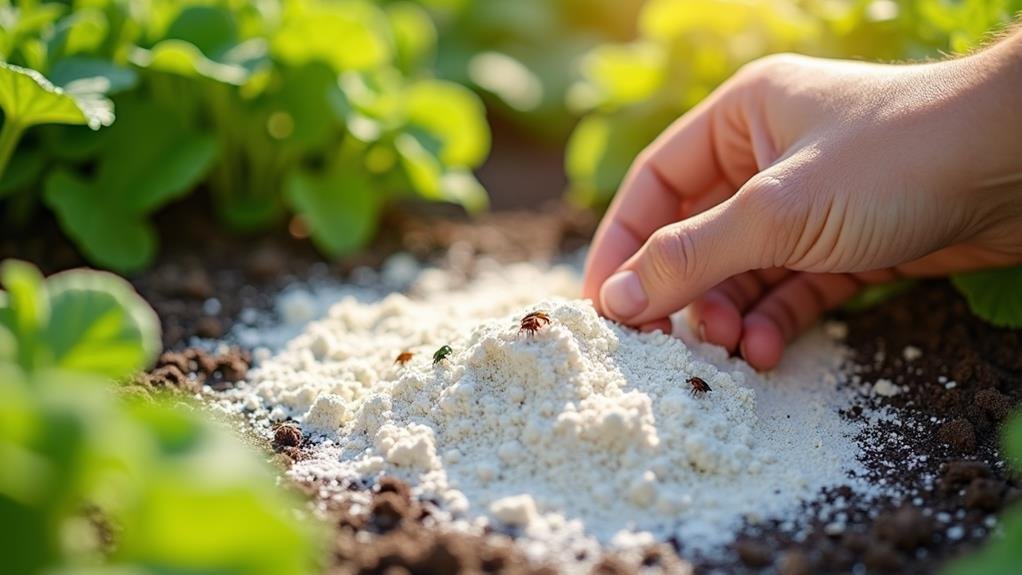
Diatomaceous earth is a versatile and effective solution for repelling garden pests. This natural powder, made from fossilized aquatic organisms, works by dehydrating insects that come into contact with it.
To use it effectively, sprinkle a thin layer around the plants you want to protect, focusing on areas where pests are likely to enter, like the base of stems or along garden paths.
You can also mix diatomaceous earth with water to create a spray. This method allows you to coat the leaves of your plants, adding an extra layer of protection. Just make sure to reapply after rain or watering, as moisture diminishes its effectiveness.
When applying diatomaceous earth, wear a mask to avoid inhaling the fine particles. It's safe for pets and humans, but it's still wise to take precautions.
Additionally, always choose food-grade diatomaceous earth, as it's free from harmful additives.
Garlic and Pepper Sprays
After effectively using diatomaceous earth, you might want to investigate other natural repellents like garlic and pepper sprays.
These sprays are simple to make and can provide a strong defense against a variety of garden pests. The pungent smell of garlic and the heat from peppers create an unwelcoming environment for critters that often invade your garden.
To create your own garlic and pepper spray, start by blending a few cloves of garlic with a couple of hot peppers in water. After blending, strain the mixture and add it to a spray bottle. You can also include a small amount of liquid soap to help the solution stick to plant leaves.
Before applying, test it on a small area of your plants to verify they won't react negatively.
When you spray your plants, focus on the undersides of leaves and areas where pests tend to congregate. Reapply every week or after rainfall for the best results.
Not only do these sprays deter pests, but they're also safe for beneficial insects, so you can protect your garden without wreaking havoc on its ecosystem.
Neem Oil Benefits
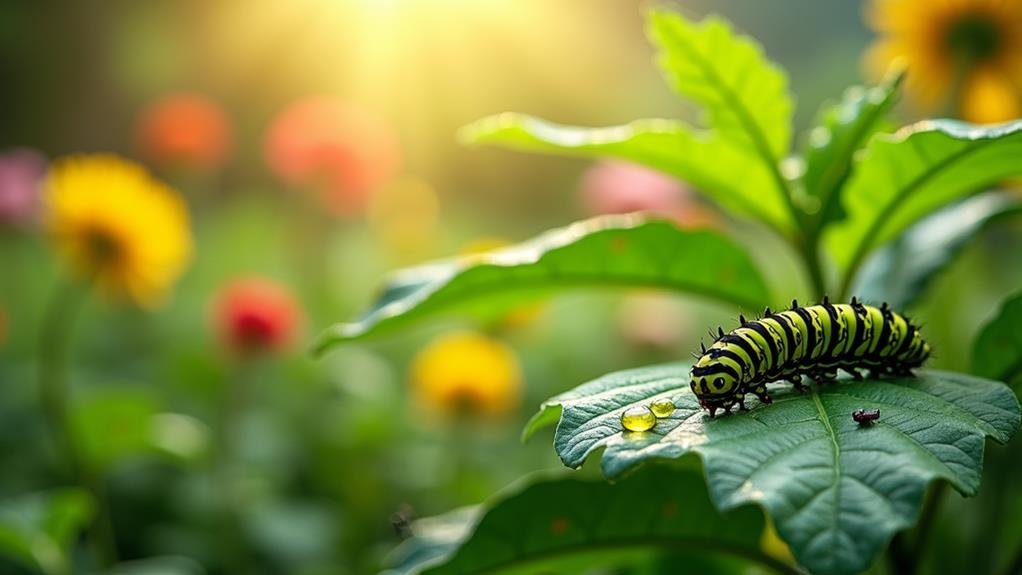
Many gardeners find neem oil to be an invaluable tool in their pest management arsenal. This natural oil, derived from the seeds of the neem tree, is packed with benefits that make it a go-to solution for many.
First and foremost, neem oil acts as a powerful insect repellent. It disrupts the life cycle of pests like aphids, spider mites, and whiteflies, reducing their populations effectively.
When you apply neem oil, it works not only as a repellent but also as a pesticide. Its active compounds, such as azadirachtin, interfere with the insects' hormonal systems, preventing them from growing and reproducing. This means that even if you don't see immediate results, you're still making an impact on the pest population over time.
Another significant benefit is its minimal impact on beneficial insects. When used correctly, neem oil targets harmful pests while sparing helpful ones, like ladybugs and bees.
Plus, it's safe for your plants and the environment, making it an excellent choice for organic gardening.
With its multifaceted approach, neem oil can help keep your garden thriving and pest-free.
Beneficial Nematodes Usage
While neem oil is effective for managing a variety of pests, beneficial nematodes offer another natural solution for tackling garden invaders, particularly those lurking in the soil.
These microscopic worms, which you can find in garden supply stores, target harmful pests like grubs and root weevils without harming beneficial insects.
To use beneficial nematodes, start by selecting the right species for your specific pest problem. Once you've made your choice, simply mix the nematodes with water, following the package instructions.
Apply this mixture to your garden, focusing on areas where you've noticed pest activity.
It's best to do this in the early morning or late afternoon when temperatures are cooler, as extreme heat can kill the nematodes.
Remember to keep the soil moist for a few weeks after applying them; this helps the nematodes move through the soil and find their prey.
You'll love the results as these tiny warriors go to work, effectively controlling pest populations.
In no time, you'll notice healthier plants and a thriving garden ecosystem.
Accept this natural approach, and let nature do the heavy lifting!
Organic Mulching Strategies
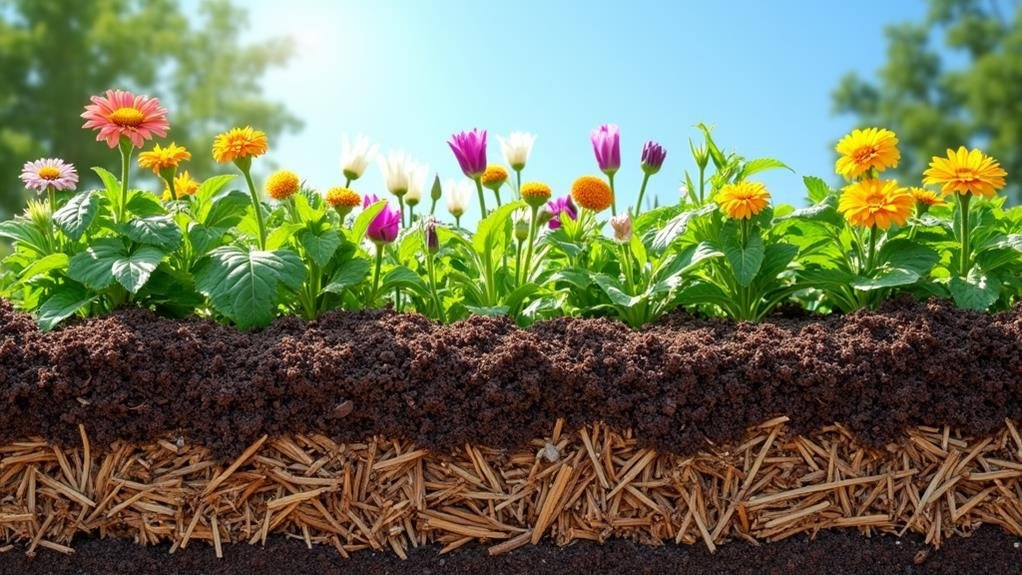
Three effective organic mulching strategies can transform your garden into a pest-repelling haven.
First, use straw or hay as mulch. Not only does it help retain moisture, but it also attracts beneficial insects that keep harmful pests at bay. When applying, spread a thick layer around your plants, leaving space near the stems to prevent rot.
Second, consider using wood chips. They decompose slowly, enriching the soil over time. Plus, their rough texture can deter certain pests like slugs and snails, which prefer smoother surfaces. Just remember to refresh the chips annually for maximum effectiveness.
Lastly, try using grass clippings. These are an excellent source of nitrogen, and they break down quickly, enriching your soil. Be sure to let them dry out first to prevent matting, which can suffocate your plants.
Apply a thin layer to avoid compacting.
Conclusion
Incorporating these natural methods can greatly improve your garden's health while keeping pests at bay. By using essential oils, companion planting, and introducing beneficial predators, you can create a balanced ecosystem. Homemade insecticidal soaps and diatomaceous earth provide effective barriers, while garlic and pepper sprays add an extra punch. Don't forget the power of neem oil and organic mulching to support your plants. Adopt these strategies, and your garden will thrive, free from unwanted pests.

